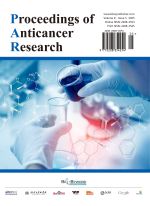Synergistic Potential of Traditional Chinese Medicine and CART Cell Therapy: Immunoenhancement and Persistence Regulation Strategies
Abstract
CAR-T cell therapy demonstrates tremendous potential for tumor treatment, yet faces challenges in solid tumor therapy due to immune suppression, T-cell exhaustion, and cytokine release syndrome (CRS) induced by the tumor microenvironment (TME). Traditional Chinese medicine (TCM) holds substantial potential to enhance CAR-T efficacy and mitigate adverse reactions due to its multi-targeted advantages. TCM active ingredients and formulations can synergistically amplify CAR-T anti-tumor effects while reducing adverse events through multiple mechanisms, including reversing T-cell exhaustion, prolonging CAR-T cell persistence, improving TME hypoxia and fibrosis, modulating gut microbiota, and suppressing CRS. This benefits patient treatment and recovery. Combining TCM with CAR-T therapy can increase objective response rates, prolong cell persistence, and reduce CRS incidence. Future efforts will focus on exploring the precise mechanisms and standardized protocols for TCM-enhanced CAR-T treatment through high-quality clinical trials and multi-omics technologies, driving its clinical translation and application.
References
Shi D, 2022, Mechanism Study of Paeoniflorin Regulating Dendritic Cell Maturation and Differentiation via SOCS1 and SOCS3 to Influence Host Immunity Against Candida Albicans Infection, thesis, Jining First People’s Hospital.
Yu F, Miao L, Chen H, et al., 2025, Effects of Bufotalin on LDHA Expression in Hepatocellular Carcinoma Tissue and Natural Killer Cells. Chinese Journal of Immunology, 41(5): 1108–1113.
Zhang Y, Tang H, Huang R, 2020, Effects of Tanshinone IIA on H/R-Induced Myocardial Cell Damage and Inflammatory Response Mediated by miR-148-5p Overactivation of the NF-κB Pathway. Chinese Journal of Evidence-Based Cardiovascular Medicine, 12(12): 1447–1449 + 1457.
Gao Y, 2016, Mechanism of Biejiajian Pill Modified Formula in Inhibiting Hepatocellular Carcinoma Epithelial-Mesenchymal Transition via IL-6-Mediated JAK2/STAT3/TWIST Pathway, thesis, Beijing University of Chinese Medicine.
Yang X, Sun J, Wen B, Wang Y, Zhang M, Chen W, Zhao W, He C, Zhong X, Liu Y, Li T, Sun H, He S, 2021, Biejiajian Pill Promotes the Infiltration of CD8+ T Cells in Hepatocellular Carcinoma by Regulating the Expression of CCL5. Front Pharmacol, 12: 771046.
Zhang L, 2006, Research on the Immunomodulatory Mechanism of Yupingfeng Powder, thesis, Chengdu University of Traditional Chinese Medicine.
Bao K, 2020, Mechanism of Yupingfeng Powder in Anti-Allergic Inflammation Based on ILC2 Cell “Memory” and In Vivo Migration Characteristics, thesis, Nanjing University of Chinese Medicine.
Zhao N, Hu Y, Xie Y, et al., 2025, Research Progress on Natural Compounds Inhibiting VEGF for Anti-angiogenic and Anti-tumor Effects. Journal of Chinese Medicine, 1–17.
Liu B, 2022, Analysis of Coagulation and Inflammatory Status in NSCLC Patients and Study on the Effects of Tanshinone IIA and Chuanxiongzine on CSLCs Angiogenesis, thesis, Beijing University of Chinese Medicine.
Ren J, Liu X, Chen W, et al., 2013, Salvia Tannin IIA Inhibits VEGF Expression in Human Colorectal Cancer Cells via the COX-2/PGE2-β-catenin Pathway. Leveraging the Strengths of Traditional Chinese Medicine and Emphasizing Translational Medicine—Proceedings of the 2013 National Academic Conference on Traditional Chinese Medicine Oncology, Chinese Association of Traditional Chinese Medicine, Department of Oncology, Shanghai Municipal Hospital of Traditional Chinese Medicine Affiliated to Shanghai University of Traditional Chinese Medicine; Department of Oncology, Putuo Hospital Affiliated to Shanghai University of Traditional Chinese Medicine; Institute of Integrated Traditional and Western Medicine for Interventional Oncology, Shanghai University of Traditional Chinese Medicine; Department of Oncology, Shuguang Hospital Affiliated to Shanghai University of Traditional Chinese Medicine, 467–472.
Guo J, Deng Z, Fu Y, et al., 2009, Effects of Notoginsenosides on Tumor Necrosis Factor-α and Matrix Metalloproteinase Expression in Rats with Post-Myocardial Infarction Ventricular Remodeling and Their Mechanisms of Action. Journal of Southern Medical University, 29(10): 2048–2050.
Zheng Y, Zhou F, 2023, Recent Advances in the Antitumor Mechanism of Safflower Yellow Pigment. Pharmacology and Clinical Application of Traditional Chinese Medicine, 39(7): 126–129.
Cheng P, 2025, Mechanism Study of Panax Notoginseng Saponin R1 Inhibiting High-Fat Diet-Induced Colon Cancer Metastasis, thesis, Nanjing University of Chinese Medicine.
Wang W, 2011, Effects of Total Ginsenosides from Panax notoginseng on Hematoma Absorption and Plasma Matrix Metalloproteinase-9 in Patients with Intracerebral Hemorrhage. Chinese Herbal Drugs, 42(5): 963–965.
Wang X, Li Y, Chen Z, et al., 2021, Berberine Suppresses M2 Macrophage Polarization via α7nAChR-Mediated JAK2/STAT3 Inhibition. Pharmacological Research, 170: 105742.
Li H, Zhang R, Wang L, et al., 2023, Kansuipene A from Euphorbia kansui Blocks CXCL2 Transcription via NF-κB Suppression in Cytokine Release Syndrome. Biomedicine & Pharmacotherapy, 161: 114591.
Chen X, Li Y, Wang J, et al., 2023, Tanshinone IIA Enhances CD19 CAR-T Cell Persistence and Antitumor Efficacy via AMPK-Mediated Mitochondrial Biogenesis. Journal of Hepatology, 78(3): 456–467.
Liu Y, Chen X, Wang L, Zhang H, 2022, Sijunzi Decoction Modulates Gut Microbiota to Enhance Regulatory T Cell Function and Alleviate Cytokine Release Syndrome. Phytomedicine, 98: 154112.
Zhang L, Wei G, Zhao Y, Huang F, 2023, Emodin from Rheum palmatum Inhibits TLR4/NF-κB Signaling and Restores Intestinal Barrier Integrity in Experimental Colitis. Biomedicine & Pharmacotherapy, 158: 114456.
Chen X, Li Y, Wang J, et al., 2023, Tanshinone IIA Enhances CD19 CAR-T Cell Persistence and Antitumor Efficacy via AMPK-Mediated Mitochondrial Biogenesis. Journal of Hepatology, 78(3): 456–467.
Liu S, Yang R, Zhang Q, et al., 2021, Yupingfeng San Reduces Cytokine Release Syndrome in CAR-T Therapy via Modulating Th17/Treg Balance: A Multicenter Randomized Controlled Trial. Journal of Translational Medicine, 19(1): 312.
Zhang Y, Liu Y, Liu H, et al., 2021, Astragaloside IV Enhances CAR-T Cell Efficacy by Modulating Immune Checkpoint Expression and T Cell Exhaustion. Journal of Advanced Research, 32: 123–135.
Wang L, Chen X, Zhang Q, et al., 2022, pH-Responsive Triptolide-Loaded Nanogels Synergize with CAR-T Cells to Enhance Tumor Immunotherapy by Targeting Tumor-Associated Macrophages. Biomaterials, 285: 121391.

